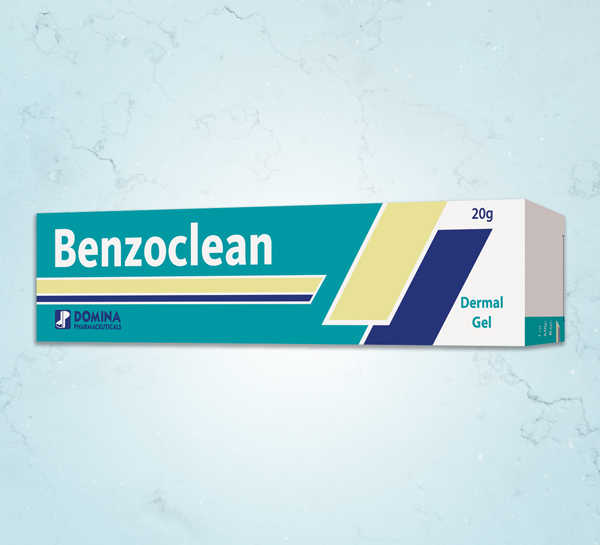
Composition:
Each 1g of Benzoclean gel contains: 12.8mg Clindamycin Phosphate (equivalent to 10mg clindamycin base and 66.7mg Hydrous Benzoyl peroxide (equivalent to 50mg anhydrous benzoyl peroxide).
Mechanism of action:
Benzoclean Gel has a combination of mild keratolytic and antibacterial properties providing activity particularly against inflamed lesions of mild to moderate acne vulgaris.
The inclusion of benzoyl peroxide reduces the potential for the emergence of organisms resistant to Clindamycin.
Usage:
Mild to moderate acne vulgaris, particularly inflammatory lesions.
Application:
Adults and adolescents: Beًnzoclean Gel should be applied once daily in the evening, to affected areas after the skin has been throughly washed, rinsed with warm water and gently patted dry.
Treatment with Benzoclean Gel should not exceed more than 12 weeks of continuous use.
Side effects:
It may cause: erythema, peeling, dryness, burning, and pruritus at the site of application.
Contraindications:
Patients with known hypersensitivity to clindamycin, lincomycin, benzoyl peroxide or to any component in the product.
Drug Interactions:
- Concomitant topical antibiotics, medicated or abrasive soaps and cleansers, soaps and cosmetics that have a strong drying effect, and products with high concentrations of alcohol and/or astringents, should be used with caution as a cumulative irritant effect may occur.
- Simultaneous application of Benzoclean Gel and topical acne preparations containing vitamin A derivatives should be avoided.
- Potential synergism exists between clindamycin and Gentamicin.
Precautions:
- Contact with the mouth, eyes and mucous membranes and with abraded or eczematous skin should be avoided. Application to sensitive areas of skin should be made with caution. In cases of accidental contact, rinse well with water.
- It should be used with caution in patients with a history of regional enteritis or ulcerative colitis, or a history of antibiotic-associated colitis, in atopic patients, in whom further skin drying may occur.
- The frequency of application should be reduced if excessive irritation or dryness develops.
- If prolonged or significant diarrhea occurs or the patient suffers from abdominal cramps, treatment with this product should be discontinued immediately, as the symptoms may indicate antibiotic-associated colitis. Suitable diagnostic methods, such as the determination of Clostridium difficile and toxin and, if necessary, colonoscopy should be employed and treatment options for colitis considered.
- The product may bleach hair or coloured fabrics.
- It is recommended that exposure to sun or sunlamps should be minimised.
- Patients should be advised that, in some cases, 4-6 weeks of treatment may be required before the full therapeutic effect is observed.
- Cross-resistance may occur with other antibiotics such as lincomycin and erythromycin when using antibiotic monotherapy.
Use during pregnancy and lactation:
The safety of Benzoclean Gel in human pregnancy is not established. Therefore, Benzoclean Gel should only be prescribed to pregnant women after careful risk/benefit assessment by the physician in charge.
It is not known whether clindamycin is excreted in human milk following the use of Benzoclean Gel, but treatment of nursing mothers with Benzoclean Gel is not recommended.